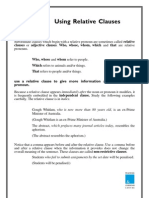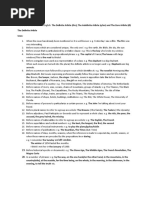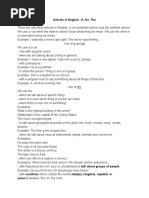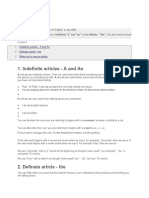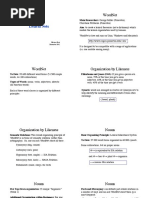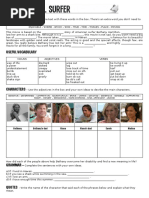0 ratings0% found this document useful (0 votes)
10 viewsARTICLES
ARTICLES
Uploaded by
nikola90bb Here is the document with the correct articles inserted:
I am from Winchester, Hampshire. Winchester is the city in the United Kingdom. I live in a town called Taunton which is on the River Tone. I live in a house in a quiet street in the countryside. The street is called "Hudson Street" and the house is old - more than 100 years old! I am an English lecturer at the college near the centre of the town. I like books, music and taking photographs. I usually have lunch at college. I usually go home by the car. We have all kinds of food in England. I like Polish food very much. Sometimes, I go to a Polish restaurant in Bath. The restaurant is called "
Copyright:
© All Rights Reserved
Available Formats
Download as PPT, PDF, TXT or read online from Scribd
ARTICLES
ARTICLES
Uploaded by
nikola90bb0 ratings0% found this document useful (0 votes)
10 views15 pages Here is the document with the correct articles inserted:
I am from Winchester, Hampshire. Winchester is the city in the United Kingdom. I live in a town called Taunton which is on the River Tone. I live in a house in a quiet street in the countryside. The street is called "Hudson Street" and the house is old - more than 100 years old! I am an English lecturer at the college near the centre of the town. I like books, music and taking photographs. I usually have lunch at college. I usually go home by the car. We have all kinds of food in England. I like Polish food very much. Sometimes, I go to a Polish restaurant in Bath. The restaurant is called "
Original Description:
English ARTICLES
Copyright
© © All Rights Reserved
Available Formats
PPT, PDF, TXT or read online from Scribd
Share this document
Did you find this document useful?
Is this content inappropriate?
Here is the document with the correct articles inserted:
I am from Winchester, Hampshire. Winchester is the city in the United Kingdom. I live in a town called Taunton which is on the River Tone. I live in a house in a quiet street in the countryside. The street is called "Hudson Street" and the house is old - more than 100 years old! I am an English lecturer at the college near the centre of the town. I like books, music and taking photographs. I usually have lunch at college. I usually go home by the car. We have all kinds of food in England. I like Polish food very much. Sometimes, I go to a Polish restaurant in Bath. The restaurant is called "
Copyright:
© All Rights Reserved
Available Formats
Download as PPT, PDF, TXT or read online from Scribd
Download as ppt, pdf, or txt
0 ratings0% found this document useful (0 votes)
10 views15 pagesARTICLES
ARTICLES
Uploaded by
nikola90bb Here is the document with the correct articles inserted:
I am from Winchester, Hampshire. Winchester is the city in the United Kingdom. I live in a town called Taunton which is on the River Tone. I live in a house in a quiet street in the countryside. The street is called "Hudson Street" and the house is old - more than 100 years old! I am an English lecturer at the college near the centre of the town. I like books, music and taking photographs. I usually have lunch at college. I usually go home by the car. We have all kinds of food in England. I like Polish food very much. Sometimes, I go to a Polish restaurant in Bath. The restaurant is called "
Copyright:
© All Rights Reserved
Available Formats
Download as PPT, PDF, TXT or read online from Scribd
Download as ppt, pdf, or txt
You are on page 1of 15
ARTICLES
English has two types of articles: definite (the)
and indefinite (a, an.)
The use of these articles depends mainly on
whether you are referring to any member of a
group, or to a specific member of a group
Indefinite Article: a and an
A and an signal that the noun modified is indefinite, referring to
any member of a group
Used with countable nouns in singular when the noun is general
a + singular noun beginning with a consonant: a boy
an + singular noun beginning with a vowel: an elephant
a + singular noun beginning with a consonant sound: a user
an + singular noun beginning with a vowel sound: an hour
If the noun is modified by an adjective, the choice between a and
an depends on the initial sound of the adjective that immedately
follows the article:
a broken egg
an unusual problem
a European country
Basic Uses of Indefinite Article
We use indefinite article to classify or
identify something/ someone:
By means of general statements:
e.g. An architect is someone who designs buildings .
In form of definitions:
e.g. A cat is a domestic animal.
By means of descriptive labels:
Origins: He’s a Frenchman.
Occupation: She’s a doctor.
Religion: He’s a Catholic.
Politics: She’s a Republican.
When something is mentioned for the first time:
e.g. I looked up and saw a plane. ( The plane flew low over the trees.)
With references of quantity ( in sense of “one”, “only
one”, “ any one”):
e.g. I’d like an apple. I need a screwdriver to do the job.
With reference to measurement:
e.g. twice a/ per day 80p a/ per kilo
40 km an/ per hour 30 miles a/per gallon
After “what” and “such”:
e.g. What a surprise! My boss is such an idiot!
With reference to illnesses/ conditions:
e.g. a cold, a headache, a sore throat, a weak heart, a broken leg
Note: with some conditions, a/ an is optional
( backache, stomach-ache, toothache) or is not used at all (
flu, hepatitis…)
Definite Article: The
The definite article is used before singular and
plural nouns as well as before uncountable
nouns when the noun is particular or specific.
The signals that the noun is definite, that it refers
to a particular member of a group
The is pronounced / / before consonant
sounds: the day, the key
The is pronounced / / vowel sounds:
the end, the hour
Basic Uses of Definite Article
Can be used to refer to the whole class (similar to
a/an):
e.g. The cobra is dangerous.
To refer to the group as a whole:
“The” + nationality adjective:
e.g. The British and the Americans have been allies for a long time.
“The” + plural names:
e.g. The Liberals want electorial reform. The Browns are not at home .
“The” + collective nouns to make general statements about
specified groups:
e.g. the police the public
When something that has been mentioned before is
referred to again:
e.g. Singleton is a quiet village. The village has a population of a few
hundred people.
Before phrases noun + “of” + noun:
e.g. The life of Napoleon The freedom of choice
To specify a person, thing:
e.g. The Smith you are looking for no longer lives here.
The letters on the shelf are for you.
In contexts which are limited enough for the listener or
reader to identify who or what is referred to:
e.g. Pass me the salt, please.
Who’s at the door? It’s the postman.
For locations which are “one of a kind”:
e.g. the earth, the sky, the moon, the solar system, the galaxy, the
universe
For “parts of a whole”, assuming the listener/ reader
knows what we are talking about:
a human being: the body, the brain, the head
a room: the ceiling, the walls, the floor etc.
- In time expressions:
e.g. the beginning, the end, the past, the present. The middle, the
morning, the evening, the afternoon
- In fixed phrases:
e.g. Have a good time have a rest have a shower
With superlatives:
e.g. This is the worst play I’ve ever seen.
With musical instruments:
e.g. Tom plays the flute.
With comparatives in fixed phrases:
e.g. The sooner the better.
With “same”
e.g. We are the same.
With decades, or groups of years:
e.g. She grew up in the seventies
With mountain ranges and groups of islands:
The Alps The Canary Islands
With oceans, seas and rivers:
The Pacific the River Nile the Caspian Sea
With some geographical areas:
The Balkans The Middle East The North Pole
With unions, and associations:
e.g. The UK, The USA, The ARE
With some countries:
The Netherlands The Phillipines
Basic Uses of Zero Article
To give general statements:
e.g. Money makes the world go round.
Life is short; art is long.
Watches have become very accurate.
To refer to a class as a whole
Cats do not like cold weather.
With names of people and their titles:
Elizabeth Brown Pope John
Madam Miss Jackson Major Rogers
Note: Wilson was elected President of the USA.
Wilson became ( the ) President of the USA.
For days, months, holidays:
e.g. June Christmas Mondays
For meals:
e.g. Breakfast is served. Michael’s at lunch.
For academic subjects:
Physics is the most difficult subject.
For transport:
e.g. by bus, by air, by boat, by coach, on foot
With nouns like school, hospital, prison, church,
university, college, court etc. when we refer to their
“primary purpose”:
e.g. He was sent to prison for four years.
Children went to school early in the morning.
After “what” and “such” when a plural or an
uncountable noun follow:
e.g. What fools they are!
We has such problems during the holiday!
In fixed phrases:
e.g. at night, face to face, keep in mind, go on holiday, make friends,
make fun of, arm in arm etc.
With names of lakes, towns, islands, mountains and
most countries:
e.g. Serbia Lake Geneva New York
With languages and nationalities:
e.g. She is French. I don’t speak French.
After the 's possessive case:
e.g. His brother's car.
Peter's house.
Insert the right article – a / an / the / or
zero
I am from Winchester, Hampshire. Winchester is ______ city in
_____ United Kingdom. I live in _____ town called ______
Taunton which is on ______River Tone. I live in _____ house in
_____ quiet street in the countryside._____ street is called
"Hudson Street" and _____ house is old - more than 100 years
old! I am _____English lecturer at ______college near ______
centre of _______ town. I like ______ books, music and taking
______photographs. I usually have ______lunch at college. I
usually go ______ home by ______car. We have all kinds of
food in ______England. I like _______Polish food very much.
Sometimes, I go to _______ Polish restaurant in Bath.______
restaurant is called "Magda's". ______Polish food is delicious!
You might also like
- P.4 Eng Lesson Notes Term 3Document38 pagesP.4 Eng Lesson Notes Term 3EMMANUEL BIRUNGINo ratings yet
- English Grammar Today Book With CD Rom Sample PagesDocument10 pagesEnglish Grammar Today Book With CD Rom Sample PagesTaki Taki56% (9)
- Irregular Verbs List (SPANISH)Document2 pagesIrregular Verbs List (SPANISH)jossepg50% (6)
- Definition: The Indefinite Article Is Just The Opposite of The Definite Article. in English, TheDocument8 pagesDefinition: The Indefinite Article Is Just The Opposite of The Definite Article. in English, ThegordansimNo ratings yet
- Lesson 6 - ArticlesDocument2 pagesLesson 6 - ArticlesAkbarul AminNo ratings yet
- Unit 1. The Definite Article. Theory and ExercisesDocument12 pagesUnit 1. The Definite Article. Theory and ExercisesizasbjNo ratings yet
- Assessment With RubricDocument2 pagesAssessment With Rubricapi-502476739100% (1)
- Relative ClausesDocument2 pagesRelative ClausesDiego Gustavo CuquejoNo ratings yet
- Personal and Impersonal Passive ConstructionsDocument3 pagesPersonal and Impersonal Passive ConstructionsTijana Doberšek100% (1)
- Password Reset B2 CST 8BDocument1 pagePassword Reset B2 CST 8B2JNo ratings yet
- Articles A An TheDocument14 pagesArticles A An TheSilvia Alejandra SuarezNo ratings yet
- Grammar Basics A1Document8 pagesGrammar Basics A1SairamTirumalaiGovindarajuNo ratings yet
- ArticlesDocument12 pagesArticlesRobert SkorkaNo ratings yet
- Uses of ArticlesDocument29 pagesUses of Articlesjean d segura75% (4)
- English Has Two Articles: .: Some Important Grammar Rules ArticlesDocument6 pagesEnglish Has Two Articles: .: Some Important Grammar Rules ArticlesUma Kalyani0% (1)
- Advanced Articles A (An) vs. The - ENGLISH PAGEDocument10 pagesAdvanced Articles A (An) vs. The - ENGLISH PAGESujan AcharyaNo ratings yet
- Cours Grammaire Anglaise L2 S2... 2023-2Document12 pagesCours Grammaire Anglaise L2 S2... 2023-2ndiayekamsa58No ratings yet
- English ArticlesDocument20 pagesEnglish Articlesmasthan6yNo ratings yet
- Article 2-1Document18 pagesArticle 2-1AuraNo ratings yet
- Grammar 1 ArticlesDocument4 pagesGrammar 1 ArticlesMagdalena RamisNo ratings yet
- Тема 3. Definite and Indefinite ArticlesDocument53 pagesТема 3. Definite and Indefinite ArticlesКравець Руслан Андрійович ВНАУNo ratings yet
- Unit 1. The First Unit of The Section "Nouns" Is Called "Semantic Classes of Nouns"Document5 pagesUnit 1. The First Unit of The Section "Nouns" Is Called "Semantic Classes of Nouns"Женя РовдоNo ratings yet
- ARTÍCULOSDocument26 pagesARTÍCULOSsenabriansergio4No ratings yet
- DeterminersDocument26 pagesDeterminersZ_JahangeerNo ratings yet
- Welcome TO The Presentation Grammar/Structure 1: By: ZumaDocument29 pagesWelcome TO The Presentation Grammar/Structure 1: By: Zumasri rahayuNo ratings yet
- Titularizare EnglezaDocument62 pagesTitularizare EnglezaAlexandra Candrea100% (1)
- How To Use ArticlesDocument7 pagesHow To Use Articlescrazy about readingNo ratings yet
- Articles The - An A - Non ArticleDocument3 pagesArticles The - An A - Non ArticleDaniel Silva NievesNo ratings yet
- Note PrepositionDocument22 pagesNote Prepositionsyazwani_azmal591No ratings yet
- ARTICLES: Definite Article - The' / Indefinite Article - A' or An' A' Is UsedDocument1 pageARTICLES: Definite Article - The' / Indefinite Article - A' or An' A' Is UseddolawerprincessNo ratings yet
- Articles & Preferences FixDocument12 pagesArticles & Preferences FixnfairuzNo ratings yet
- Articles Full LessonDocument7 pagesArticles Full LessonNORMA ZOGHEIBNo ratings yet
- We Usually Use No Article To Talk About Things in General - The Doesn't Mean AllDocument13 pagesWe Usually Use No Article To Talk About Things in General - The Doesn't Mean Allulink leeNo ratings yet
- How To Use English ArticlesDocument11 pagesHow To Use English ArticlesIbrahim GhazalNo ratings yet
- Seminarski Rad Engleski JezikDocument19 pagesSeminarski Rad Engleski JezikTamara Tasha MarkovicNo ratings yet
- Summary of Unit 2-StructuresDocument3 pagesSummary of Unit 2-StructuresPenta Olivia RayendraNo ratings yet
- Updated English Grammar For Francophone StudentsDocument92 pagesUpdated English Grammar For Francophone StudentsivannayameogoNo ratings yet
- ArticlesDocument5 pagesArticlesZahoor Ul HaqNo ratings yet
- To Use The A and AnDocument3 pagesTo Use The A and AnRomán Sánchez MonsalveNo ratings yet
- ArticlesDocument3 pagesArticlesiustina matei17No ratings yet
- ArticleDocument4 pagesArticleWajihaNo ratings yet
- The ArticleDocument12 pagesThe ArticlecarguibayNo ratings yet
- The Definite ArticleDocument5 pagesThe Definite Articleivana_culjak_07No ratings yet
- Grammar.A-The-Zero ArticlemklDocument4 pagesGrammar.A-The-Zero Articlemklistow.74532050No ratings yet
- The NOUN GROUP (Determiners, Modifiers & Pronouns)Document12 pagesThe NOUN GROUP (Determiners, Modifiers & Pronouns)Sorin MariusNo ratings yet
- Lesson 6Document5 pagesLesson 6Johao Velasquez LovonNo ratings yet
- The Indefinite, Definite and Zero ArticleDocument2 pagesThe Indefinite, Definite and Zero Articlepaula20farteaNo ratings yet
- m12 Articles (A, An, The, Zero Article)Document11 pagesm12 Articles (A, An, The, Zero Article)3MA20Reynaldi Satria NNo ratings yet
- Articles in English A, An and TheDocument4 pagesArticles in English A, An and Themartin nikolovskiNo ratings yet
- A, AnDocument9 pagesA, AnRutNo ratings yet
- ArticlesDocument3 pagesArticlesMilitaru LuminitaNo ratings yet
- Articles Definite Indefinite: The Articles: Uses (1) The Articles in Specific ReferenceDocument7 pagesArticles Definite Indefinite: The Articles: Uses (1) The Articles in Specific ReferenceMariana PerussiaNo ratings yet
- A An TheDocument5 pagesA An TheAgnieszka KNo ratings yet
- Indefinite Article: A / An: 'An' With Nouns Starting With A Vowel (A, E, I, O, U)Document4 pagesIndefinite Article: A / An: 'An' With Nouns Starting With A Vowel (A, E, I, O, U)Fitri NurwanaNo ratings yet
- AdjectivesDocument10 pagesAdjectivesAzmi RahmanNo ratings yet
- ARTICLESDocument13 pagesARTICLESRahmadina FebrianiNo ratings yet
- Eterminers - Htm#articles: The Teacher, A College, A Bit of Honey, That Person, Those People, WhateverDocument4 pagesEterminers - Htm#articles: The Teacher, A College, A Bit of Honey, That Person, Those People, Whateversoylu3No ratings yet
- Some and OthersDocument263 pagesSome and OthersigrenNo ratings yet
- Seminar PaperDocument12 pagesSeminar Paperriki velkovNo ratings yet
- Article Definite - IndefiniteDocument6 pagesArticle Definite - IndefiniteakneronNo ratings yet
- For Example An ADocument4 pagesFor Example An AAkari Etsuko Herrera PobleteNo ratings yet
- Grammar Definite and Indefinite ArticlesDocument6 pagesGrammar Definite and Indefinite ArticlesMohsenMohsenAliMosaeid100% (1)
- I Used to Know That: Stuff You Forgot From SchoolFrom EverandI Used to Know That: Stuff You Forgot From SchoolRating: 3.5 out of 5 stars3.5/5 (6)
- Homonyms; Multiple-Meaning Words; Or One Reason English is Difficult to LearnFrom EverandHomonyms; Multiple-Meaning Words; Or One Reason English is Difficult to LearnNo ratings yet
- GuíaBurros: Spanish Grammar Cheat Sheet: A quick and easy guide to Spanish GrammarFrom EverandGuíaBurros: Spanish Grammar Cheat Sheet: A quick and easy guide to Spanish GrammarRating: 4 out of 5 stars4/5 (1)
- Engleski PrepositionsDocument20 pagesEngleski Prepositionsnikola90bbNo ratings yet
- Engleski Past Perfect TenseDocument10 pagesEngleski Past Perfect Tensenikola90bbNo ratings yet
- Engleski FutureDocument9 pagesEngleski Futurenikola90bbNo ratings yet
- Engleski I NounsDocument23 pagesEngleski I Nounsnikola90bbNo ratings yet
- Type 1 Conditional SentencesDocument2 pagesType 1 Conditional SentencesCláudia Sampaio100% (1)
- Part of SpeechDocument13 pagesPart of SpeechtiffiNo ratings yet
- Past Continuous Oral PresentationDocument3 pagesPast Continuous Oral PresentationDaniel PisciottiNo ratings yet
- 86Document14 pages86Айнур АннамухаммедоваNo ratings yet
- Adjective or Adverb Grammar Guides - 20789Document1 pageAdjective or Adverb Grammar Guides - 20789KatyOchieNo ratings yet
- Relationships: Types of RelationshipDocument2 pagesRelationships: Types of RelationshipLinh ChuNo ratings yet
- PoS-Noun, PrepositionDocument14 pagesPoS-Noun, PrepositionAngelłicaNo ratings yet
- Piggy Bank: Curs: English - Intermediate Modul: Past Simple Tense Unitate: Piggy BankDocument10 pagesPiggy Bank: Curs: English - Intermediate Modul: Past Simple Tense Unitate: Piggy Bankvasilica888No ratings yet
- Narration Exercises For SSC and JSC - Skylark EducationDocument15 pagesNarration Exercises For SSC and JSC - Skylark EducationChandanNo ratings yet
- Glossika - Japanese Verb HandbookDocument87 pagesGlossika - Japanese Verb Handbookshreneek100% (5)
- Session 5 Incomplete SentenceDocument60 pagesSession 5 Incomplete SentenceHotma RianiNo ratings yet
- Seminar Handout Final PDFDocument36 pagesSeminar Handout Final PDFRobin SahaNo ratings yet
- Class 7 English Grammar 2024-25Document36 pagesClass 7 English Grammar 2024-25farhathusnain478No ratings yet
- Wordnet: Lexical NetsDocument6 pagesWordnet: Lexical NetsPichaco BrosNo ratings yet
- GS 101Document15 pagesGS 101JestoniNo ratings yet
- 11 INGLÉS GUIA DE DE VERIFICACIÓN No 001 3P CURRICULO FLEXOBLE CCAV 2020Document6 pages11 INGLÉS GUIA DE DE VERIFICACIÓN No 001 3P CURRICULO FLEXOBLE CCAV 2020Camila Dulhai BermudezNo ratings yet
- Worksheets Grammar 1Document5 pagesWorksheets Grammar 1Harum EldyasNo ratings yet
- Lesson 1: Saint Joseph College of Sindangan Incorporated Sindangan, Zamboanga Del NorteDocument23 pagesLesson 1: Saint Joseph College of Sindangan Incorporated Sindangan, Zamboanga Del NorteAngelica Sevilleno UgdaminaNo ratings yet
- 6b Gerunds and InfinitivesDocument10 pages6b Gerunds and InfinitivesDiego Luna LeyvaNo ratings yet
- Soul Surfer Guide L4Document2 pagesSoul Surfer Guide L4Maria Victoria RieraNo ratings yet
- MOdule 3 activity 2Document7 pagesMOdule 3 activity 2yahirabdelNo ratings yet
- Grade 2 English Worksheets CbseDocument3 pagesGrade 2 English Worksheets CbseSharon100% (3)
- English IVDocument3 pagesEnglish IVALLYN II CRISOLONo ratings yet
- Prefixes and Suffixes WorksheetsDocument9 pagesPrefixes and Suffixes WorksheetsYuliana Iteh100% (1)







